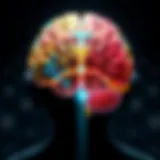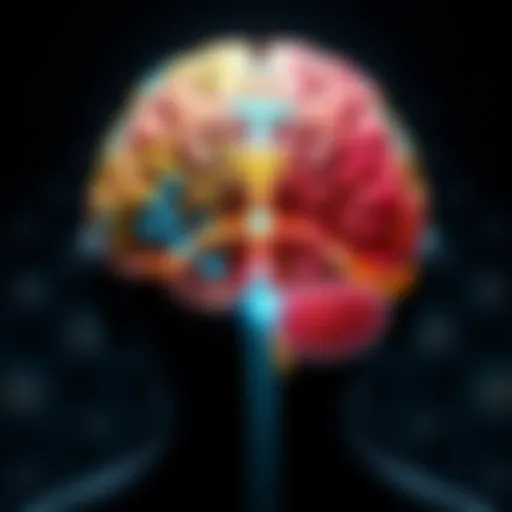Raising Genius: Exploring Giftedness in Children


Intro
Raising genius in children involves a complex interplay of several factors. These factors include psychological attributes, educational experiences, and environmental contexts that contribute to the development of giftedness. Understanding how these elements interact is vital for anyone involved in the upbringing or education of talented youth. The significance of this topic cannot be overstated; it is imperative for parents, educators, and policy makers to consider effective methods for nurturing talent from an early age.
Research in this domain suggests that both innate potential and external influences shape a child's abilities and future achievements. The challenge lies in recognizing that every child is unique and, therefore, requires a tailored approach that respects their individual differences. This discussion aims to create a thorough understanding of how to raise genius and provide actionable insights for fostering a supportive environment.
Research Background
Overview of the scientific problem addressed
The study of giftedness has evolved significantly. While much emphasis was previously placed solely on cognitive abilities, contemporary views recognize the multidimensional nature of talent. Psychological attributes, educational practices, and socio-cultural contexts all merge to create a nurturing ecosystem for potential geniuses. This compilation of insights allows for a more comprehensive approach to the understanding of giftedness.
Historical context and previous studies
Historically, educators often isolated gifted students into separate programs without considering their holistic development. Research from scholars like Howard Gardner and Joseph Renzulli has paved the way for a broader perspective. Gardner’s theory of multiple intelligences suggests that talent is not confined to academic excellence alone. Renzulli’s three-ring conception of giftedness combines ability, task commitment, and creativity. These models encourage us to rethink how we develop and support gifted children. Historical studies have mainly focused on cognitive tests, but the modern approach calls for more inclusive views.
Findings and Discussion
Key results of the research
Many studies affirm the necessity of early identification and intervention. Systems that recognize and foster unique abilities are more successful in cultivating talent. For example, the research indicates that children exposed to varied learning experiences tend to flourish more than those restricted to traditional methods. Key results highlight the importance of collaboration between home environments and educational institutions to nurture giftedness effectively.
Interpretation of the findings
The interpretation suggests that a balanced approach is both possible and necessary. It is crucial to mix structured learning with creativity and exploration. Parents and educators should embrace the notion that fostering a child's innate potential doesn't mean pushing them into rigid systems but rather providing opportunities for discovery and self-expression.
"Effective nurturing of gifted children requires recognizing their individual needs and contextual circumstances."
Understanding Genius
The exploration of genius is essential in understanding the principles that can guide the development of exceptional abilities in children. It delves into the characteristics and traits that define gifted individuals. A clear understanding of genius not only helps in identifying potential but also plays a crucial role in creating supportive environments that foster the growth of these unique individuals. By examining both innate and acquired traits, we can better appreciate how genius manifests and how it can best be nurtured.
Furthermore, it serves as a foundation for drawing connections between various influencing factors such as genetics, environment, and psychological elements. This holistic view helps educators, parents, and researchers develop strategies that optimize the upbringing of gifted children while minimizing misunderstandings associated with genius. Thus, understanding genius becomes a cornerstone for an effective approach to raising talent.
Defining Genius
Defining genius is more than just labeling individuals with extraordinary capabilities. It involves exploring various dimensions such as intellectual, artistic, and emotional brilliance. Genius is often associated with high IQ scores, but this narrow view overlooks other aspects like creativity, imagination, and problem-solving skills.
Some common definitions of genius include:
- Intellectual Capability: Exceptional cognitive abilities, often measured through standardized tests.
- Creative Expression: Individuals who produce original and impactful work in art, music, or literature.
- Emotional Intelligence: Gifted individuals who exhibit profound empathy and social skills that allow them to navigate complex interpersonal situations effectively.
By redefining genius to encompass a wider scope, we can open doors to diverse talents and capabilities, paving the way for a broader understanding of giftedness beyond mere statistics.
Historical Perspectives on Genius
Historical perspectives on genius reveal how societal views have shaped our understanding of outstanding individuals throughout time. In ancient cultures, genius was often viewed through a supernatural lens. Figures like Socrates and Homer were seen as divinely inspired, their abilities attributed to the gods rather than any human endeavor.
In the Renaissance, the concept shifted with the likes of Leonardo da Vinci and Michelangelo, who embodied the idea of the 'universal man.' Their genius was recognized as a result of both innate talent and extensive hard work. This evolution continues into contemporary discussions, where the narrative now encompasses a more scientific approach, considering genetics and environmental factors.
"Genius is one percent inspiration and ninety-nine percent perspiration." – Thomas Edison
Understanding these historical shifts not only provides context for current discussions about genius but also highlights the variability in definitions and perceptions over time. This perspective is crucial for anyone looking to nurture gifted individuals today, as it emphasizes the importance of context in nurturing genius.
The Role of Genetics
The exploration of genius often leads one to the intricate web of genetics. Genetic factors undoubtedly play a significant role in shaping cognitive abilities and intellectual potential. Research indicates that intelligence has a heritable component. This means that genetic inheritance can influence not only how capable a child may become but also their tendencies towards creativity, problem-solving, and divergent thinking. Understanding the role of genetics is crucial when analyzing how to nurture gifted children effectively.
Inheritance and Intelligence
The relationship between inheritance and intelligence is both complex and profound. Studies suggest that genetics account for approximately 50 to 80 percent of the variance in intelligence scores among individuals. This data supports the idea that intelligence is not solely a product of environment or upbringing. Instead, it is significantly woven into our genetic blueprint.
Children may inherit specific traits that predispose them to excel academically or in creative endeavors. For instance, traits linked to high performance in mathematics or linguistic proficiency can sometimes be traced back to genetic markers. However, this perspective raises important questions about the implications of such knowledge.


- Implications for Parenting: If certain intellectual abilities can be inherited, parents may feel pressured to identify and cultivate these traits early. This can lead to a more proactive approach in providing resources and enrichment opportunities.
- Ethical Considerations: There are ethical considerations associated with focusing too heavily on genetics. It is essential to balance the potential benefits with the risk of reinforcing deterministic views of intelligence.
Nature Versus Nurture
The age-old debate of nature versus nurture remains a pertinent discussion in the context of raising genius. While genetics set the stage, environmental factors orchestrate the play. The interaction between genetic predispositions and environmental influences shapes a child's development profoundly.
Research shows that although we inherit certain abilities, the environment significantly impacts how these abilities manifest. A nurturing home with encouragement, resources for development, and educational opportunities can enhance inherited traits. Conversely, a lack of such support may hinder even the brightest potentials.
- Positive Environments: Cultivating an atmosphere that fosters curiosity, openness, and encouragement can help children thrive, allowing their inherent talents to emerge fully.
- Consideration of Individual Differences: Not all children with similar genetic backgrounds will develop in the same way. Individual temperament and personal experiences will also play crucial roles in the development of genius.
"The interplay of genetics and environment is critical in understanding the full spectrum of giftedness. Recognizing this complexity can help parents and educators create conditions that foster exceptional talents."
In summary, recognizing the significance of genetics, along with the complexities introduced by environmental factors, equips parents, educators, and policymakers with a nuanced understanding of nurturing giftedness. It is not about choosing one over the other; rather, it involves understanding how both elements intermingle to form the fabric of intellectual potential.
Environmental Influences
The environment surrounding a gifted child plays a crucial role in their development. Factors such as family dynamics and educational surroundings significantly shape their abilities and talents. Understanding these influences can help parents, educators, and professionals create the right atmosphere to nurture growth and potential.
A supportive structure enables gifted individuals to explore and cultivate their skills. It assists in creating a foundation that balances challenges and support. Proper guidance helps gifted individuals navigate their unique experiences while fostering creativity and honing their abilities.
Family Dynamics and Genius
Family is often the first and most influential environment a child interacts with. The dynamics within a family can either enhance or inhibit a child’s intellectual development. Supportive families encourage curiosity and provide resources for learning. They recognize and embrace the child’s unique talents, fostering an atmosphere conducive to growth.
Contrarily, negative family environments can lead to social isolation or a lack of motivation. The pressure to perform or adhere to unrealistic expectations may harm the child’s self-esteem. Therefore, creating a well-balanced family dynamic is essential.
Some key aspects to consider in family dynamics include:
- Open Communication: Encouraging children to express thoughts and feelings promotes emotional intelligence and critical thinking.
- Encouragement of Exploration: Allowing children to pursue their interests nurtures their natural abilities, leading to a more profound sense of self.
- Flexibility in Learning: Different children have different learning styles. Being open to various approaches satisfies unique needs and fosters a love for learning.
Educational Environment's Impact
The educational environment is equally significant. It shapes not only cognitive skills but also social and emotional development. Schools that prioritize creativity and critical thinking encourage unique talents to flourish.
An effective learning environment offers:
- Diverse Curriculum: Subjects that challenge a child intellectually and emotionally, sparking their interest and sustaining engagement.
- Flexible Teaching Methods: Incorporating various instructional styles caters to the individual learning preferences of gifted students.
- Supportive Peer Relationships: A positive peer environment helps gifted students feel valued and understood, reducing feelings of isolation.
"The environment must be designed to stimulate creativity, encourage questions, and allow exploration. It creates the foundation for emerging talents to thrive."
Through careful consideration of these influences, parents and educators can tailor their approaches to maximize a child’s potential.
Fostering Talent
Fostering talent in gifted children is crucial for their development. Providing the right environment, educational methods, and support systems can unlock their full potential. It is not only about enhancing academic skills but also about nurturing emotional and social aspects of their growth. When we discuss fostering talent, we are addressing a multifaceted process that involves collaboration between parents, educators, and the wider community.
Educational Approaches
Educational approaches play a pivotal role in nurturing genius. Selecting the right method is essential to match the needs of gifted individuals. Here, we will explore three significant educational strategies: Traditional Methods, Montessori and Alternative Education, and Gifted Programs.
Traditional Methods
Traditional methods of education focus on structured learning and rote memorization. This approach emphasizes a curriculum based on standardized testing and academic discipline. These features yield good foundational knowledge and can foster discipline in learners. Many parents and educators find these methods effective for instilling basic skills.
However, traditional methods can fall short for gifted learners. They may find the pace slow and the curriculum unchallenging. This leads to disengagement and lack of motivation. Consequently, while they offer benefits in foundational knowledge, the potential downsides include boredom and lack of stimulation.
Montessori and Alternative Education
Montessori and alternative education foster learning through exploration and self-directed activities. This approach is centered on understanding the child’s interests and allowing them to learn at their own pace. It promotes creativity, critical thinking, and independence. Gifted children typically thrive in such environments, as they can pursue topics of genuine interest.
The unique feature of Montessori education is the mixed-age classroom. This setup allows younger children to learn from their older peers, thereby fostering a sense of community and collaboration. However, some critics argue that this system may not provide enough structure needed for learners who require clear guidance and boundaries.
Gifted Programs
Gifted programs are specialized educational offerings designed for high-achieving students. These programs provide advanced coursework, enrichment activities, and opportunities for independent research. Gifted programs aim to challenge students and help them engage deeply with subject matter that interests them.


A significant benefit of gifted programs is their focus on creating an intellectually stimulating environment. They can provide socialization with peers who share similar abilities and interests. Nevertheless, these programs can sometimes be elitist and may not cater to the diverse needs of all gifted learners. Additionally, access to such programs may be limited by geographical and socio-economic factors.
Encouraging Creative Thinking
Encouraging creative thinking is essential for fostering talent. It promotes problem-solving skills and innovation, allowing gifted individuals to express their talent fully. Activities that stimulate creativity include open-ended projects, brainstorming sessions, and collaborative tasks. By engaging gifted children in such exercises, we can help them develop critical skills for future success.
"Creativity involves breaking out of established patterns in order to look at things in a different way."
Psychological Factors
Understanding the psychological components that underlie giftedness is crucial for both educators and parents who aim to nurture a child's potential. Intelligence and creativity are not merely products of genetics and environment; they are significantly shaped by an individual's mindset, emotional makeup, and resilience. This section will delve into these key psychological factors, emphasizing their importance in fostering a truly brilliant mind.
The Mindset of Genius
The concept of a genius mindset is vital in shaping how gifted individuals approach their work and personal growth. Carol Dweck's research on fixed versus growth mindsets illustrates this notion vividly. A growth mindset cultivates resilience, encouraging individuals to embrace challenges, persevere in face of setbacks, and view effort as a pathway to mastery. This contrasts with a fixed mindset, where intelligence is seen as static; individuals with this mindset may shy away from opportunities that challenge them.
Key aspects of fostering a genius mindset include:
- Encouragement of Curiosity: Promoting an inquisitive nature encourages children to ask questions and seek deeper understanding.
- Emphasis on Effort: Recognizing effort rather than just results helps children appreciate the learning process.
- Building Resilience: Teaching coping strategies for failure and setbacks is crucial.
By instilling these principles, parents and educators can help cultivate a mindset conducive to lifelong learning and creativity, which are essential for genius development.
Emotional Intelligence
Emotional intelligence (EI) is another cornerstone in the psychological development of gifted individuals. EI encompasses the ability to identify, understand, and manage emotions in oneself and others. Research indicates that higher emotional intelligence correlates with greater success in various life domains, including academics, relationships, and professional pursuits.
Key benefits of fostering emotional intelligence include:
- Enhanced Communication Skills: Gifted individuals with high EI can articulate thoughts more effectively, facilitating better interactions.
- Empathy and Understanding: A deeper understanding of others' feelings leads to better collaboration and social relationships.
- Stress Management: High emotional intelligence equips individuals with skills to cope with stress and anxiety, which are common among gifted individuals.
To develop emotional intelligence in children, caregivers can:
- Model Emotional Awareness: Demonstrating how to express emotions healthily encourages children to articulate their feelings.
- Provide Opportunities for Reflection: Encouraging children to reflect on their emotional responses fosters deeper self-awareness.
- Teach Empathy: Activities and discussions focused on perspective-taking can enhance empathetic understanding.
In summary, both the mindset of genius and emotional intelligence significantly impact the trajectory of giftedness in individuals. The interplay of these psychological factors not only shapes how gifted children view themselves but also how they engage with the world around them.
"A genius is just a talented person who does his or her homework." - Thomas Edison
As we continue to explore the realm of giftedness, recognizing these psychological elements offers greater insight into how to effectively nurture talent and intelligence in young minds.
Challenges Faced by Gifted Individuals
Gifted individuals often face unique challenges that can hinder their development and emotional well-being. Recognizing these challenges is vital for parents, educators, and policymakers. Understanding the struggles of giftedness can lead to more effective strategies to support these individuals. The psychological and social obstacles often stem from societal expectations, personal pressures, and the complexities of their innate abilities.
Social Expectations and Isolation
Gifted individuals frequently grapple with social expectations that can be unrealistic. They may be seen as the "smart one" and are often thrust into roles that come with pressure. This can lead to feelings of isolation. When a gifted child does not meet the high standards set by peers or adults, it can create a sense of failure. The child might feel that they must constantly prove themselves.
Moreover, gifted children can struggle to find peers with similar interests or abilities. This social disconnectedness can lead to loneliness. They may feel misunderstood or out of place among their age group, isolating them further.
Important points to consider include:
- Understanding diversity among giftedness: Not all gifted children excel in the same areas. Some may have exceptional creative talents, while others shine in academics. This diversity makes it crucial to foster environments where various talents are appreciated.
- Encouraging authentic connections: Parents and educators should strive to facilitate connections with peers who share similar interests. This can help gifted individuals feel understood and valued.
"Intellectual giftedness can be both a gift and a burden, especially if not balanced with emotional and social skills."
Burnout and Overexertion
Gifted individuals also face a heightened risk of burnout. Their intense focus and passion for their interests can lead to overexertion. When talent is not matched with adequate support systems, it’s easy for gifted individuals to become overwhelmed. They may take on excessive workloads or sign up for numerous activities to fulfill external expectations.
This burnout is often exacerbated by the fear of failure. Many gifted individuals believe they must maintain a high level of performance at all times. This can result in:
- Physical exhaustion: Constant pressure can lead to fatigue, affecting overall health.
- Mental health issues: Anxiety and depression are common among gifted individuals experiencing burnout. The relentless pursuit of excellence can create an internal conflict that is difficult to resolve.
Parents and educators must be mindful of these signs. Developing an awareness of balance is crucial. Encouraging breaks and fostering resilience is essential in helping gifted individuals manage their energy effectively.


Case Studies of Prominent Geniuses
Case studies of prominent geniuses offer valuable insights into the many dimensions of giftedness. Analyzing their lives helps uncover factors that contribute to extraordinary achievements. By studying these cases, researchers, educators, and parents can draw lessons on nurturing talent effectively. The contextualization of genius within individual life experiences, societal expectations, and available resources sheds light on what it truly means to cultivate brilliance.
Profiles of Historical Figures
Historical figures like Albert Einstein, Leonardo da Vinci, and Marie Curie exemplify how various elements intersect to create genius.
- Albert Einstein: Known for his theory of relativity, Einstein’s early education was marked by struggles against traditional teaching methods. His curiosity was often stifled, yet he thrived outside formal education, reflecting a need for environments that foster free thinking.
- Leonardo da Vinci: A polymath, Da Vinci’s genius was a product of relentless exploration across diverse disciplines. His artistic and scientific endeavors highlight the significance of interdisciplinary learning, seen in him pursuing art, anatomy, engineering, and beyond.
- Marie Curie: Curie broke barriers in science with her research on radioactivity. Her story underscores the vital role of persistence and support systems. Notably, her partnership with Pierre Curie allowed her to navigate challenges of gender in science effectively.
These profiles illustrate that genius is not simply about innate ability; it also involves perseverance, supportive environments, and a passion for exploration.
Modern Examples
In the contemporary realm, individuals such as Malala Yousafzai and Elon Musk represent modern-day geniuses driven by a vision and purpose.
- Malala Yousafzai: As an advocate for girls' education, Malala's story illustrates how brilliance can emerge from adversity. Her relentless advocacy highlights not only intellectual ability but also emotional resilience, addressing both personal and social challenges.
- Elon Musk: A key figure in technology and innovation, Musk’s approach merges creativity with engineering. His ventures, from SpaceX to Tesla, reflect a commitment to pushing boundaries. Learning about his journey shows how strategic risk-taking can redefine possibilities, contributing to advancements in multiple fields.
By examining these modern examples, it becomes clear that genius is multi-faceted, influenced by both individual qualities and the ability to leverage opportunities in one’s environment.
Notably, the case studies affirm that while understanding the individual aspects of genius is vital, context cannot be overlooked. The interaction between personal attributes and external factors shapes each unique path.
In summary, case studies of prominent geniuses highlight the value of a comprehensive analysis of their lives. By viewing their stories through various lenses, we can glean essential strategies for fostering genius in future generations.
Practical Guidelines for Parents
Raising a gifted child comes with distinctive challenges and opportunities. A deep understanding of how to nurture talent is essential for parents who wish to create an environment conducive to genius development. This segment outlines practical guidelines that focus on recognizing potential and building a supportive atmosphere, ultimately fostering creativity and innovation.
Recognizing Potential
Identifying giftedness in children is many times nuanced and complex. Gifted children may not always stand out in conventional ways, such as by excelling academically or exhibiting high intelligence in typical subjects. Therefore, parents must be observant of various signs of potential.
Some indicators of giftedness include:
- Curiosity: An insatiable desire to learn and ask questions.
- Advanced vocabulary: Use of a vocabulary that surpasses that of peers.
- Intensity: Strong reactions to experiences and emotions.
- Problem-solving skills: Ability to think critically and devise innovative solutions.
Recognizing these traits is vital, as early acknowledgment of a child’s unique abilities can lead to better support and guidance. Engaging in activities that challenge their thinking can further reveal their potential. It is also beneficial for parents to communicate with educators, as teachers often provide valuable insights into a child’s capabilities in an academic setting.
Creating a Supportive Home Environment
A nurturing home environment serves as the foundation for a child’s genius development. This environment should reflect warmth, encouragement, and stimulation. Here are key considerations for achieving this:
- Encourage Exploration: Provide resources and materials that promote open-ended exploration and creativity. For instance, art supplies, science kits, or literature can spark interest.
- Promote Independence: Allow children to pursue their interests independently. This fosters self-confidence and encourages intrinsic motivation.
- Limit Distractions: Create a space that minimizes disruptions, allowing children to focus on their activities.
- Support Emotional Health: Open channels of communication. Enable children to express their thoughts and feelings without fear of judgment. Validate their emotions to help them navigate challenges.
- Encourage a Growth Mindset: Teach children that effort and persistence lead to improvement. Celebrate failures as learning opportunities, rather than setbacks.
“The development of genius is less about inherent talent and more about the environment that cultivates it.”
Consistent implementation of these practices can help shape a conducive environment for giftedness. Parents play a pivotal role by recognizing potential early and providing the support necessary for their children to thrive.
The Future of Genius Development
The exploration of genius development is more than an academic pursuit; it serves as a guiding beacon for educators, parents, and policymakers. Recognizing how genius can be nurtured and developed opens pathways to creating an educational system that prioritizes individual talents while catering to diverse needs. As society continues to evolve, so must our approaches to fostering giftedness. This requires considering changing dynamics within education, psychological insights, and advancements in research.
Understanding the future of genius development involves actively engaging with emerging trends and innovative research directions. These elements will shape not only the frameworks through which we view intelligence, but also the practical methodologies for nurturing talent. An informed approach will ensure that the desires and capabilities of gifted individuals are met with appropriate support.
Emerging Trends in Education
Recent shifts in educational strategies illustrate a growing recognition of the need for personalized learning environments. Schools are embracing flexible curricula that allow for adaptability according to students' unique needs. This shift prioritizes the importance of fostering creativity and critical thinking over rote memorization.
Some key trends worth noting include:
- Project-Based Learning: This pedagogical approach encourages students to engage in real-world projects that integrate multiple disciplines. It promotes problem-solving skills and collaboration, which are essential for genius development.
- Technology Integration: The integration of technology plays a crucial role in customizing learning experiences. Online platforms can provide tailored resources that challenge gifted students, allowing them to progress at their own pace.
- Social-Emotional Learning (SEL): Increasingly, educators recognize the significance of emotional intelligence. This assists students in developing resilience and empathy, crucial for those labeled as gifted who often face unique social challenges.
These emerging trends reflect a commitment to accommodating diverse learner profiles and preparing them for future challenges.
Innovative Research Directions
Research continues to evolve, offering deeper insights into the nature of genius and creativity. Studies increasingly focus on the neurological and cognitive aspects of giftedness, unveiling how different brain functions influence learning capabilities.
Some exciting research directions include:
- Neuroscience of Creativity: Understanding how the brain's wiring affects creative thought could lead to more effective educational techniques.
- The Impact of Mindfulness: Early studies suggest mindfulness practices may enhance focus and creativity, raising questions about integrating them into gifted education.
- Analysis of Diverse Genius Models: Examining various cultural perspectives on genius can foster a more inclusive approach, challenging traditional views and highlighting different dimensions of intelligence.







